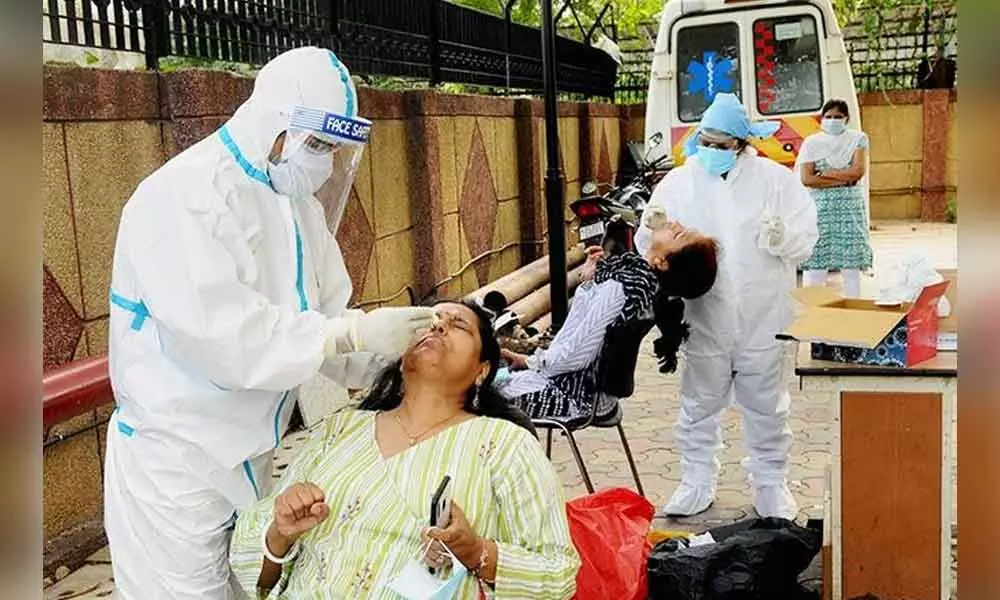Hyderabad could be having 6 lakh active Corona cases: Study

Hyderabad could be having 6 lakh active Corona cases: Study
- Coronavirus in Hyderabad: Covid-19 surveillance using sewage samples predicts infected cases in State capital could be ten times more than the government figures
- CCMB and IICT teams did this joint study
- The study, that covered about 80% of the STPs in Hyderabad, reveals that there are around 2 lakh people who are shedding viral materials
Coronavirus in Hyderabad: While the actual Covid-19 cases in GHMC limits are just under 50,000 so far, a joint study by CCMB and IICT predicted the infected number could be more than ten times the actual figure.
The study estimated that the overall number of potentially infected people in Hyderabad (including symptomatic and asymptomatic ) could be around 6 lakh, which is 6 per cent of the city population. A conservative estimate of the number of active cases who are shedding the virus maybe around 2.6 lakh. Since an infected person sheds viral material in faecal samples for up to 35 days, this study is expected to provide an overall estimate of the situation in a window of one month.
Individuals who are infected with coronavirus shed not only through nasal and oral routes but also through faeces shed virus. This provides an opportunity to use sewage/wastewater samples to estimate the spread of the infection in a given locality or area. The SARS-CoV-2 in sewage samples is non-infectious, thus making sewage samples suitable for epidemiological studies. Estimating the spread is very important in identifying the affected areas, and controlling the pandemic. Since an infected person sheds viral material in faecal samples for up to 35 days, these studies will provide an overall estimate of the situation in a window of one month.
In a collaborative effort, CCMB and IICT researchers harvested the sewage samples to estimate the number of potentially infected individuals in the city. Sewage samples from major STPs were processed for detecting presence of SARS-CoV-2 viral RNA. Of the 1800 million litre water used daily in Hyderabad, 40% is processed at different sewage treatment plants (STPs). While viral RNA is detectable in the inlet samples, the outlet (after treatment) samples of STP were largely clean (free from viral RNA) indicating efficient treatment practices at STP.
This study, that covered about 80% of the STPs in Hyderabad, revealed that there are around 2 lakh people who are shedding viral materials. Since only 40% of the Hyderabad sewage reaches STPs, this data can be used to extrapolate the overall number of potentially infected people, which turned out to be approximately 6 lakh, which is around 6 per cent of the city's population, which includes symptomatic, asymptomatic, and also recently recovered individuals in a time window of about 35 days. A conservative estimate of the number of active cases who are shedding the virus, maybe around 2.6 lakhs. The findings are posted on the preprint server for health sciences, MedRxiv, which is yet to be peer-reviewed.
"Our finding clearly indicates that a large proportion of the affected individuals are asymptomatic and did not need hospitalisation. This is also in agreement with the observation that hospitalisation rush or mortality is way lower than otherwise expected with such a large infection rate at a given time. It explains why our healthcare system has been able to handle reasonably well the situation during the pandemic," Dr. Rakesh K Mishra, Director, CCMB said.
"Such studies if carried out in coordination with civic bodies to identify the hotspots in the city and monitor the dynamics of the infection rate can assist the system in taking necessary measures", he added. All the experiments were conducted at the CCMB COVID-19 testing facility and the teams included Hemalatha Manupati, Kopperi Harishankar and S Venkata Mohan from IICT and Uday Kiran, C G Gokulan, Santosh Kumar Kuncha and Rakesh K Mishra from CCMB.











